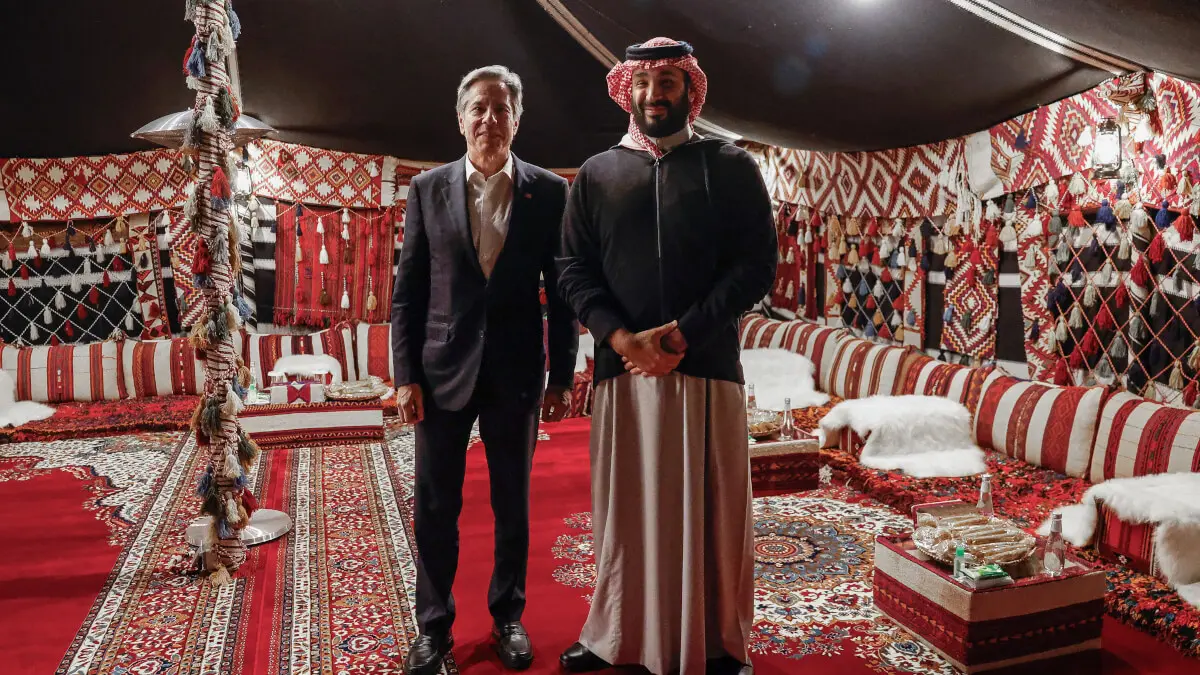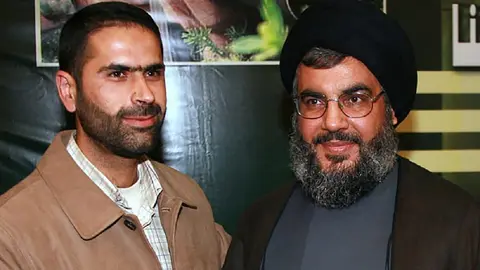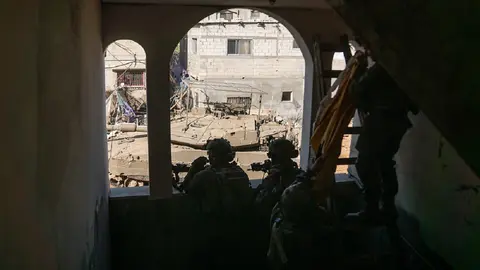US begins to shape Gaza's post-war future with Middle East leaders

US Secretary of State Antony Blinken has returned to the Middle East on his fourth trip to the region since the start of the war between Israel and Hamas to defuse tensions as fears grow that the conflict in Gaza will expand.
- Middle East leaders 'determined' to prevent war from spreading
- Israel-Saudi Arabia normalisation remains on the table
- Regional leaders call on Blinken to push for ceasefire
- Blinken stresses that Houthi threats are a matter of "global concern"
Saudi Arabia was one of the key visits on this trip before moving on to Israel. In the Kingdom, Blinken met with Saudi Crown Prince Mohammed bin Salman in the resort town of Al Ula.
Saudi Arabia is one of the countries in the region, along with others such as Turkey, Jordan, the United Arab Emirates and Qatar, that are willing to participate and contribute in Gaza the day after the war. In this sense, financial support from both Riyadh and Abu Dhabi could be key to achieving any plan.
Despite statements by some far-right Israeli politicians on the displacement of Palestinians from the Gaza Strip, Blinken has expressed his rejection of this plan. "Palestinian civilians must be allowed to return to their homes as soon as conditions permit. They should not be pressured to leave Gaza," the US diplomat said during a press conference in Qatar, another stop on his regional trip.
Israeli President Isaac Herzog himself said that the mass displacement of Palestinians in Gaza was "absolutely not the position of the Israeli government".
I met this morning, with the US Secretary of State @SecBlinken, & thanked him for his unwavering support for the State of Israel, together with @POTUS Biden & the US Administration.
— יצחק הרצוג Isaac Herzog (@Isaac_Herzog) January 9, 2024
We discussed the ongoing plight of the hostages & the need to bring them home immediately.
I… pic.twitter.com/xVFsF4ppjK
Middle East leaders 'determined' to prevent war from spreading
Blinken was upbeat and satisfied after his meeting with the Saudi crown prince and other regional leaders, saying that he found leaders everywhere "determined" to prevent the conflict from spreading and "doing everything possible to deter escalation and prevent a widening of the war".
In addition to Qatar and Saudi Arabia, Blinken has also visited Turkey, Crete, Greece, Jordan and the United Arab Emirates. After visiting Israel, he will move on to the West Bank and Egypt, where he will conclude his regional trip.
Wrapped day 3 of a trip that has taken us thus far to Türkiye, Greece, Jordan, Qatar, the UAE, and Saudi Arabia.
— Secretary Antony Blinken (@SecBlinken) January 9, 2024
Everywhere I went, I found leaders who are determined to prevent the conflict from spreading. We laid out a few basic objectives and agreed to work together on them. pic.twitter.com/OPbRoUinv0
Blinken will arrive in Cairo shortly after the visit of an Israeli security delegation to the Egyptian capital to negotiate the release of the hostages. According to the Qatari media Al-Arabi Al-Jadid, the Israelis arrived on Monday in order to resume talks after they were suspended on Hamas' orders following the assassination of the organisation's number two, Saleh al-Arouri, in Beirut.
The leaders of the nations Blinken has visited in recent days "agreed to work together and coordinate efforts to help Gaza stabilise and recover", the secretary of state himself acknowledged, according to the AP. With this regional tour, Washington is not only seeking to prevent the conflict from expanding, but also to chart a political path for Gaza once the war is over.
Prime Minister Benjamin Netanyahu is currently holding a private meeting with US Secretary of State Antony Blinken, at the Kirya in Tel Aviv.
— Prime Minister of Israel (@IsraeliPM) January 9, 2024
An expanded meeting with members of the War Cabinet will be held afterward. pic.twitter.com/8v0PPqIRQg
Israel-Saudi Arabia normalisation remains on the table
However, any post-war scenario for Gaza must be approved by the Israeli government, which remains opposed to the two-state solution, a proposal that has lost support in the Israeli political arena since 7 October, even within the opposition.
A two-state solution is also a prerequisite for Riyadh before normalising relations with Israel, one of Washington's main foreign policy objectives. In this regard, Blinken noted that Mohammed bin Salman remains interested in a deal with Israel "but it will require an end to the conflict in Gaza, and it will also clearly require that there is a practical path to a Palestinian state".
Watch: US State Secretary Antony #Blinken arrives in Saudi Arabia’s #AlUla to meet Crown Prince Mohammed bin Salman.#SaudiArabia #US #MBS
— Al Arabiya English (@AlArabiya_Eng) January 8, 2024
Read more: https://t.co/3uHV66qhc3 pic.twitter.com/Eq7HOyxH0j
Regional leaders call on Blinken to push for ceasefire
Blinken's regional visit kicked off this weekend in Turkey, where he met with senior Turkish officials as well as President Recep Tayyip Erdogan. Ankara was a key stop on Blinken's Middle East trip because of Erdogan's influence in preventing the conflict from spreading.
Turkey has for years hosted senior members of Hamas, an Islamist group with whom Erdogan has close ties. During the current war, the Turkish leader has used a harsh tone against Israel - even comparing Prime Minister Benjamin Netanyahu to Adolf Hitler - and has again moved away from Jerusalem after numerous efforts to reconcile after years of confrontation.
Erdogan meets Blinken in Istanbul pic.twitter.com/tzvhqa5Hol
— Ragıp Soylu (@ragipsoylu) January 6, 2024
During his meeting with Erdogan, Blinken stressed the need to prevent the conflict from spreading, secure the release of hostages, expand humanitarian assistance and reduce civilian casualties. They also discussed the role Turkey can play in the day after the war in Gaza.
Erdogan, like other regional leaders in Doha or Amman, has called on the US chief diplomat to press Israel to accept a ceasefire, despite the fact that it has been Hamas and other armed groups in Gaza such as Palestinian Islamic Jihad that have rejected the latest truce proposals.
DAY 94: Al-Qassam Brigades claims responsibility for firing rockets toward central Israel. pic.twitter.com/jB95w9X1vX
— Hamdah Salhut (@hamdahsalhut) January 8, 2024
Blinken stresses that Houthi threats are a matter of "global concern"
However, the war in Gaza was not the only issue Blinken addressed during his trip. In addition to the Israeli offensive in the Palestinian heartland and the actions of Hamas, attacks by Hezbollah and the Houthis - both backed by Iran - are other security threats in the region. Moreover, in the case of the Houthis, they put international trade at risk.
As Blinken noted in Doha, this is not just a regional issue, 'but a matter of global concern', referring to Yemen's Houthi rebels and their attacks on merchant ships in the Red Sea.
This conflict must not expand. We condemn the Houthi attacks in the Red Sea – one of the busiest trade corridors – which have disrupted or diverted nearly 20% of global shipping. This increases the cost and time of moving food, fuel, medicine, and humanitarian assistance.
— Secretary Antony Blinken (@SecBlinken) January 8, 2024
The Houthis' destabilising actions are affecting international trade and the interests of more than 40 countries. Blinken also recalled that their attacks and threats have led to the disruption or diversion of almost 20% of global shipping.
"These Houthi attacks are hurting people all over the world, especially the poor and vulnerable populations, including in Yemen and Gaza," said Blinken, who took the opportunity to defend the recent US-led international naval alliance in the Red Sea.










